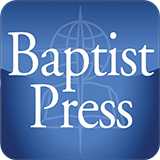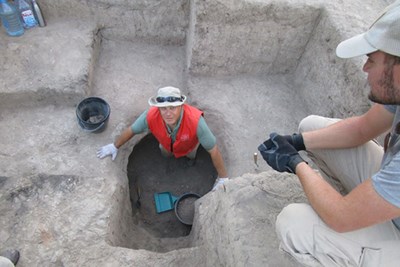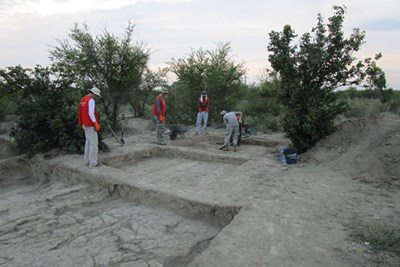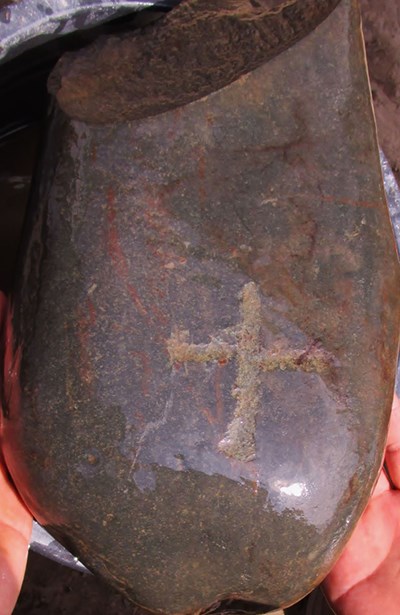
Copyright (c) 2016 Baptist Press. Reprinted from Baptist Press (www.baptistpress.com), news service of the Southern Baptist Convention. The original story can be found at http://www.bpnews.net/47654/kazakhstan-archaeology-could-bolster-evangelism

Tandy Institute historian Steven Gilbert was among a team that searched for evidence of early Christianity in Kazakhstan. Photo courtesy of Tom Davis.
Photo courtesy of Tom Davis. USHURAL, Kazakhstan (BP) — Christians in Kazakhstan are hopeful a discovery there by Southwestern Baptist Theological Seminary archaeologists will bolster their evangelistic efforts, though a secular scholar of the region at Indiana University is skeptical of the prospect.
In August, a team from Southwestern’s Tandy Institute for Archaeology unearthed seven 12th-century Christian grave markers in the ancient city of Ilyn Balik, near the Chinese border. The find was follow-up work to the discovery of a similar stone by a local two years ago and represents the first archaeological evidence for an ancient Christian community in the Muslim-majority nation.
The discovery was “a God thing,” said Tom Davis, professor of archaeology at Southwestern and co-leader of the Kazakhstan project along with Tandy Institute director Steven Ortiz.
Because the local who found the original grave marker moved it, Davis said, the archaeologists didn’t know where to dig for other evidence of Christianity. However, a walking survey of the area, in which team members were “flipping over every stone we saw,” led to “a cluster of the gravestones.”

An August excavation in Kazakhstan led by Southwestern Baptist Theological Seminary’s Tandy Institute for Archaeology unearthed the first archaeological evidence of ancient Christianity in the Muslim-majority nation.
Photo courtesy of Tom Davis. Southwestern’s Ryan Stokes, assistant professor of Old Testament, deciphered a date corresponding to A.D. 1162 in one stone’s Old Syriac inscription.
The find has “huge” significance for Kazakh Christians, Davis told Baptist Press.
The grave markers, which bear crosses typical of eastern Christianity, provide local believers with a “cultural defense” of their faith by allowing them to cite it as “rooted in who [they] have been in the past,” Davis said.
Though scholars long have known Christians were part of Kazakhstan’s history, there is significant ignorance of that Christian heritage among average Kazakhs, said Zane Pratt, the International Mission Board’s vice president for global training and a former regional leader in Central Asia.
“Most Kazakhs would say that to be a Kazak is to be a Muslim,” Pratt told BP, noting Islam came to dominate Central Asia between the seventh and 17th centuries.

A 12th-century grave marker bearing an eastern-style cross was found by archaeologists in the ancient city of Ilyn Balik, near the Kazakhstan-China border. Photo courtesy of Tom Davis. Russians began importing Eastern Orthodox Christianity when they gained control of the area now known as Kazakhstan in the 19th century, and a divide emerged between Kazakh Muslims and Russian Orthodox Christians.
In the minds of many Kazakhs, Pratt said, “it’s almost like, if you leave Islam, you’re betraying your ethnic identity.”
That mindset has drawn some opposition from Kazakhstan’s government in an effort to combat Muslim extremism and to foster a “multicultural ethos” in the Central Asian nation with the largest Russian population, Pratt said.
To those ends, the government has posted a press release about the Christian grave markers on Kazakhstan’s U.S. embassy website and is supporting publication of a book about the Tandy Institute team’s excavation, Davis said.
Pratt has heard reports from Christians in Kazakhstan who are “excited about this” discovery, he said.
“It helps them form a new narrative,” Pratt said. “The hope — and I think somewhat the experience already — is that this gives people a new openness to look at Christianity.”
He added, “What happened in the 12th century matters deeply to someone in most parts of the world,” in contrast with many Americans’ historical myopia.
Gardner Bovingdon, associate professor of Central Eurasian studies at Indiana University, is measured in his assessment of the discovery’s potential impact. He told BP there is neither widespread denial nor ignorance of the Christian aspects of Kazakhstan’s past, noting, “Kazakh school children are taught about the religiously plural past of their country from the time they’re small.”
“Most Kazakhs,” Bovingdon said, “would not be surprised by the finding that there are burial stones for the Christians who lived there. I think they would also feel it really doesn’t affect their lives. And I think contemporary evangelizing in Kazakhstan and historical findings really don’t have much connection.”
Davis, of Southwestern, is waiting to see how Kazakhs by and large react to publication of the discovery, which likely will appear in an archaeological journal this winter.
Davis anticipates “pushback” from Islamic fundamentalist elements in Kazakhstan’s government, he said. Yet he hopes many Kazakhs will react like a local near the excavation site who expressed thankfulness that, in light of the find, “nobody can tell me I don’t have Christian roots.”
A team from Southwestern is scheduled to return to Kazakhstan for more excavation next summer.
Get Baptist Press headlines and breaking news on Twitter (@BaptistPress), Facebook (Facebook.com/BaptistPress) and in your email (www.bpnews.net/SubscribeBP).




